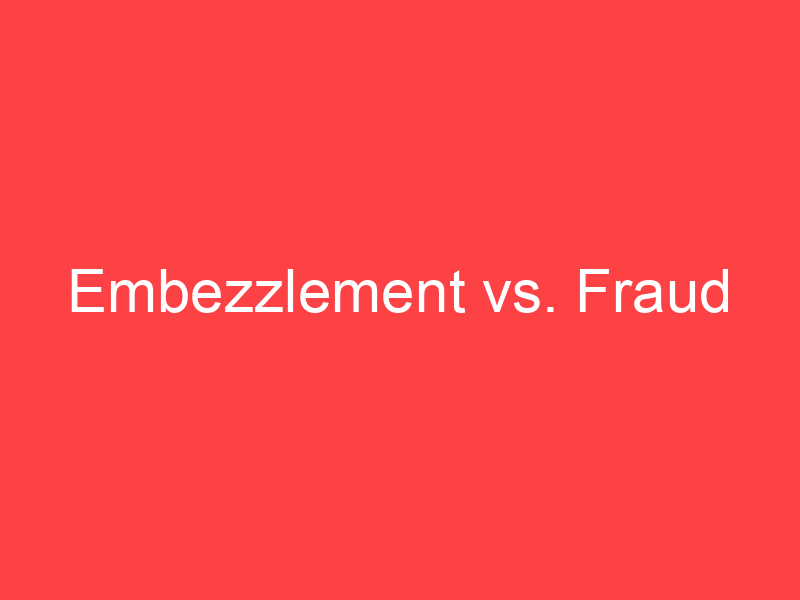Main Difference
The main difference between Embezzlement and Fraud is that the Embezzlement is a theft of assets entrusted to another person by the person that the assets were entrusted to and Fraud is a intentional deception made for personal gain or to damage another individual
-
Embezzlement
Embezzlement is the act of withholding assets for the purpose of conversion (theft) of such assets, by one or more persons to whom the assets were entrusted, either to be held or to be used for specific purposes. Embezzlement is a type of financial fraud. For example, a lawyer might embezzle funds from the trust accounts of their clients; a financial advisor might embezzle the funds of investors; and a husband or a wife might embezzle funds from a bank account jointly held with the spouse.
Embezzlement usually is a premeditated crime, performed methodically, with precautions that conceal the criminal conversion of the property, which occurs without the knowledge or consent of the affected person. Often it involves the trusted individual embezzling only a small proportion of the total of the funds or resources they receive or control, in an attempt to minimize the risk of the detection of the misallocation of the funds or resources. When successful, embezzlements may continue for many years without detection. The victims often realize that the funds, savings, assets, or other resources, are missing and that they have been duped by the embezzler, only when a relatively large proportion of the funds are needed at one time; or the funds are called upon for another use; or when a major institutional reorganization (the closing or moving of a plant or business office, or a merger/acquisition of a firm) requires the complete and independent accounting of all real and liquid assets, prior to or concurrent with the reorganization.
In the United States, embezzlement is a statutory offence that, depending on the circumstances, may be a crime under state law, federal law, or both; therefore, the definition of the crime of embezzlement varies according to the given statute. Typically, the criminal elements of embezzlement are the fraudulent conversion of the property of another person by the person who has lawful possession of the property.
-
Fraud
In law, fraud is deliberate deception to secure unfair or unlawful gain, or to deprive a victim of a legal right. Fraud itself can be a civil wrong (i.e., a fraud victim may sue the fraud perpetrator to avoid the fraud or recover monetary compensation), a criminal wrong (i.e., a fraud perpetrator may be prosecuted and imprisoned by governmental authorities), or it may cause no loss of money, property or legal right but still be an element of another civil or criminal wrong. The purpose of fraud may be monetary gain or other benefits, such as obtaining a passport or travel document, driver’s license or qualifying for a mortgage by way of false statements.A hoax is a distinct concept that involves deliberate deception without the intention of gain or of materially damaging or depriving a victim.
-
Embezzlement (noun)
The fraudulent conversion of property from a property owner.
-
Fraud (noun)
The crime of stealing or otherwise illegally obtaining money by use of deception tactics.
-
Fraud (noun)
Any act of deception carried out for the purpose of unfair, undeserved and/or unlawful gain.
-
Fraud (noun)
The assumption of a false identity to such deceptive end.
-
Fraud (noun)
A person who performs any such trick.
-
Fraud (noun)
A trap or snare.
-
Fraud (verb)
To defraud
-
Embezzlement (noun)
theft or misappropriation of funds placed in one’s trust or belonging to one’s employer
“charges of fraud and embezzlement”

